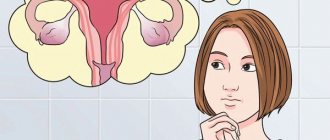The basis of many diseases is psychosomatics. Treatment of diseases that appear due to nervousness involves eliminating stress factors.
Thrush is caused by the active reproduction of opportunistic flora, which can appear against the background of psychosomatics. This creates favorable conditions for the development of gynecological pathology.
We can talk about psychosomatics if there is no effect from conservative therapy when exposed to nervous stress.
Candidiasis and psychosomatics
The development of candidiasis is inextricably linked with the characteristics of the patient’s psychological state:
- sharp and strict control of all life situations;
- rejection of life advice;
- feeling of self-doubt;
- lack of a life plan;
- suppression of anger, aggression, inability to express one’s emotions.
It has been proven that chronic thrush occurs in women if they constantly reject male attention.
Psychosomatic causes and symptoms
The characteristics of a woman’s behavior, her attitude towards life, men, sex life and other aspects of human relationships directly affect the number and activity of yeast fungi and the ability of the immune system to fight inflammatory processes. Quite often, the immune system in such cases is suppressed, which is an additional reason for the progression of the pathological condition.
Relationship with partner
There are women who believe that sex is dirty, shameful and unacceptable. Even when married, a woman, of course, has sex, but considers it as one of the forms of violence that she agreed to in order to have children. Doctors have proven that these women more often than others suffer from disturbances in the normal microflora of the vagina.
It is significant that vaginal discharge has a strong and unpleasant odor, thereby repelling men. A vicious painful circle arises: the lack of sex gives rise to a further exacerbation of vaginal candidiasis.
Relationships with the internal and external world
Negative emotions and nervous reactions contribute to the appearance of thrush. It happens that due to nervous soil, women cannot build contacts with other people. In this case, they become withdrawn, which only makes the problem worse.
Inappropriate reactions to nervous experiences and processes occurring in the inner world also negatively affect the activity of candida. This is why thrush most often affects lonely, insecure, shy and complex people.
How to help the body get rid of thrush?
Since nervous stress suppresses the immune system, during the treatment of vaginal candidiasis the patient should be prescribed immunoactivators - drugs that produce protective cells. In addition to drug treatment, the girl must adhere to the following diet:
- give up flour and sweets, depriving the fungus of its main source of energy;
- consume large amounts of vitamin-containing foods (cereals, vegetables, fruits).
But strengthening the immune system alone is not enough. With chronic stress, the body will wear out more, spending a lot of energy on worries. In this case, it is necessary to find the source of unrest and get rid of it once and for all. Remember that there are no hopeless situations, and take care of yourself and your health.
Why does thrush occur due to stress?
Often women develop thrush due to stress. The nervous system is the same part of the body as the cardiovascular, digestive, reproductive and others. Worries and anxiety inevitably lower the local immunity of various organs, this has been confirmed by many psychosomatic studies. Therefore, it is advisable to consider negative emotions among the reasons for the appearance of symptoms of candidiasis.
Can thrush be caused by nervousness?
Thrush due to nervousness happens to every representative of the fairer sex at least once in her life. It especially worries women who are dissatisfied with the quality of their lives and who are prone to total control of themselves and their loved ones. The main symptoms of a fungal infection may appear - itching and burning in the intimate area, characteristic vaginal discharge with an odor.
This phenomenon is physiologically justified. Stressful situations are accompanied by increased secretion of the hormone cortisol by the adrenal glands. Excessive amounts of it cause an increase in blood sugar and blood pressure, and also reduces overall immunity.
All these consequences of experiences are considered favorable conditions for the proliferation of the fungus candida albicans, which provokes the appearance of candidiasis in women. Under normal comfortable living conditions, these microorganisms live on all mucous membranes of organs without causing discomfort.
The mechanism of development of thrush
Every woman in her life has encountered vaginal candidiasis at least once. This is a condition in which the healthy microflora of the vagina is replaced by opportunistic microorganisms called fungi of the genus Candida. These microscopic creatures are present in the vaginal microflora of completely healthy girls, but not in large quantities.
Under the influence of an irritating factor of exo- or endogenous origin, beneficial vaginal bacteria die, and fungi actively take their place. As a result, a woman may experience symptoms characteristic of thrush: thick white or white-yellow discharge with a distinct odor, and in more severe cases, burning, itching and pain in the genital area.
Stress and its consequences for a woman’s body
Thrush from stress can create many problems. In addition to unpleasant manifestations, it raises suspicions of the infidelity of the sexual partner. But if you know the processes that occur in the body under the influence of negative emotions, difficulties in relationships can be avoided.
In a stressful situation, the adrenal glands release large amounts of the fear hormone, cortisol. This increases blood sugar levels and activates muscle function. This is how nature intended it to make it easier for a person to cope with difficulties. But chronic stress leads to constant production of cortisol. This wears out the body, manifesting itself as drowsiness, increased appetite, and deterioration of brain activity. In addition, a regular excess of this hormone in the blood can significantly worsen women’s health and lead to various diseases:
- digestive system: most often there are problems with stool, appetite increases, you want unhealthy high-calorie food to “eat up” stress, and if it is sweet, then it additionally increases the sugar level and disrupts the intestinal microflora, and this is considered a favorable condition for the proliferation of Candida fungi;
- cardiovascular system, manifested by high blood pressure;
- reproductive system: due to hormonal fluctuations, thrush most often appears.
Due to the fact that stress adversely affects the immune system, chronic diseases worsen during it, and the body becomes much more sensitive to infections.
In addition, constant exposure to nervous tension has the following consequences:
- nervousness, irritability, aggression;
- sudden mood swings, tearfulness;
- violation of sleep patterns: even with frequent drowsiness, it is not easy for a woman to fall asleep on time;
- decreased libido, intimacy does not bring pleasure.
Are all diseases caused by nerves?
But can emotional distress seriously affect women's health? Physiological studies have shown that in girls, stress has a greater detrimental effect on the functioning of internal organs and systems. This is explained by the fact that women tend to experience more negative emotions during extreme situations.
Healthy vaginal microflora is part of the protective system of the female organ. At the same time, it itself depends on local and general immunity. If the latter are weakened and unable to cope with the pathological process, the body begins to signal with various symptoms that there is a problem.
Only a few years ago, scientists and doctors were able to obtain evidence of the influence of nervous experiences on the state of the immune system. In this case, it is necessary to clearly distinguish between a momentary critical situation and the constant psychological discomfort in which the woman finds herself. It is the second option that threatens the deterioration of the general condition and, in particular, the development of vaginal candidiasis.
The biochemical mechanism of the effect of stress on the body is approximately the following. Nervous experiences excite the cerebral cortex. Then the impulse reaches the hypothalamus and pituitary gland, which signal to the adrenal cortex about the need to produce stress hormones.
Simultaneously with this process, the immune system loses many lymphocytes - cells that fight pathological foci and inflammation.
Inhibition of the body’s defenses—immunosuppression—begins to appear. As a result of constant stress, a woman cannot recover from thrush.
Another mechanism indirectly related to stress and influencing the growth of Candida in the vagina is overeating. Moreover, most girls prefer to “eat up stress” with candies, chocolate, cakes, etc., that is, products containing a large amount of sugar in their composition. Some girls prefer to get rid of stress through alcoholic drinks, which is doubly worse than sweets, since in addition to sugar they contain alcohol, which also reduces the body's resistance to disease.
Sugar is the best nutrient medium for pathogenic fungi. By eating or drinking away her nervous experiences, a woman may feel short-term relief in her soul, but such a “sedative” will only aggravate the pathological process, causing new psycho-emotional disorders.
Treatment and prevention
As a rule, the doctor prescribes treatment for thrush for both partners. It comes down to the use of local or internal medications, which are prescribed exclusively by a doctor. Locally acting medications are available in the forms of ointments, creams, sprays, suppositories and quickly eliminate symptoms. Oral ones are necessary if local medications do not help.
Prevention of thrush consists of:
- reliable contraception;
- maintaining a healthy lifestyle;
- eliminating stressful situations and strengthening general health;
- observing the rules of personal hygiene.
The main problem of nervous thrush is that it becomes chronic. Therefore, it is important to pay due attention to mental health. Quitting alcohol, cigarettes, excessive coffee consumption, healthy sleep, relaxation procedures and positive emotions are the main factors that contribute to the restoration and strengthening of the central nervous system.
Treatment options
To treat thrush, medications and dietary supplements are used. Restoring psychological health is important.
Main difficulties
Thrush caused by mental disorders is difficult to treat. This is explained by the fact that due to the deterioration of the mental state and due to the woman’s refusal to accept the problem, it deepens.
Due to impaired immune defenses, many forms of yeast are resistant to treatment.
Medication techniques
The following drugs are used against “nervous” candidiasis:
- Livarol;
- Clotrimazole;
- Pimafucin;
- Nystatin;
- Polygynax;
- Terzhinan;
- Nizoral;
- Fluconazole.
Most of these medications come in the form of suppositories, which is very convenient for treating thrush. Drugs are indicated to eliminate nervous disorders.
Lifestyle correction
Treatment of the disease is impossible without normalizing physical activity. Exercise should be moderate. It is recommended to quit smoking and drinking alcohol.
Proper nutrition
To get rid of thrush, you need to enrich your diet with fresh vegetables and fruits containing vitamins. Should be limited or excluded:
- sugar and confectionery;
- marinades and pickles;
- smoked meats;
- baking;
- spicy dishes.
Nerves and candidiasis
The life of bacteria in theory should not depend on the behavior of the central nervous system of the body, where they reproduce. In practice, the hormonal background is responsible for the so-called. homeostasis – constancy of internal environments.
- Body temperature;
- speed and force of contraction of the heart and blood vessels;
- muscle tone;
- speed of digestion, secretion of bile and insulin;
- kidney activity, which determines the accumulation/excretion of water and breakdown products;
- coagulability, electrolyte balance of blood acidity;
and a host of processes that ensure the relative independence of the state of the body from external factors. The environments of the ears, armpits, at the entrance to the anus, smooth skin or genital tract are considered to be borderline between external and internal. And their main parameters of existence/work are also controlled by hormones:
- local acid-base balance, where a shift in any direction is always favorable for symbiotic pathogens of various types, but is not positive for all at the same time;
- the intensity of sweating - usually acidic and including breakdown products, including the hormones themselves, which regulates the activity of microflora towards a decrease;
- the intensity of the secretion of sebum - a nutritious and at the same time astringent medium for bacteria and fungi living on the skin, preventing them from entering the pores and facilitating their comfortable reproduction on the surface.
In terms of the degree of influence on the composition of microflora and the balance of its components, such changes in the habitat “area” are equivalent to climate changes on the planet for human civilization - or dinosaurs that became extinct as a result of a cataclysm of similar scale.
Can thrush be caused by nervousness?
Cortisol, adrenaline and norepinephrine play the “first fiddle” in stress. The first usually “tells” the patient to run, and the second - to attack. Both mobilize the cardiovascular, immune, respiratory systems and muscles, forcing them to “forget” about remediable minor disorders in the body in order to solve the main problem.
They change the balance of sweat and sebum to the acidic side, which promotes the proliferation of Candida fungus. But the existing candidiasis under their influence completely ceases to be felt symptomatically.
Cortisol's job is to produce the energy the body needs to function at peak stress for a certain period of time. It accelerates the production of insulin in the islet cells of the pancreas and the breakdown of carbohydrates from food in the stomach, and in its absence, from the muscles. This gives glucose to the brain, which is intensely searching for a way out, and the muscles, which are ready to act.
A prolonged increase in cortisol levels during a prolonged unpleasant situation forces the patient, who is under “pressure” of circumstances, to overeat, gain weight, provokes stable hypertension (the cortex must be well supplied with blood, because sugar comes only from it) and rapid wear of the islets of Langerhans, which leads to diabetes diabetes type II. If there is not enough glucose in food, it “brings down” muscle and blood cells, including immune cells, to its source.
Treatment
The complication can often be stopped at the local level if:
- douche morning and evening, 3-7 days, with anti-inflammatory and restorative herbs - decoction/infusion of calendula, sage, chamomile, yarrow. The amount for the entire treatment will not exceed 40-100 rubles;
- administer rectal-vaginal (depending on gender) suppositories with immune proteins for up to 2 weeks in a row, once a day, to replace the “eaten” cortisol - like “Kipferon”, containing immunoglobulins with interferons (give general and only antiviral activity, respectively). The cost of their course will be 400-800 rubles;
- Women are advised to administer in courses of 3/3 days, 1 pc. per day, vaginal suppositories with cultures of lactic acid bacteria - “Acilact” (74-135 rubles per pack) or “Bifidumbacterin” (30-70 rubles per 10 pcs.). It is more convenient for men to treat exacerbations of candidiasis with lyophilisate of the indicated drugs (douching/washing).
Prevention
But the best solution here is to learn how to eliminate the effects of stress. The outcome of crises does not always depend on the will of the individual. Plus, it can be positive or negative, inflicting a “finishing” blow on his psyche with the risk of a nervous breakdown.
And even if the previous situation has a favorable outcome, a new one will not be long in coming - such is the structure of life. Some good ways to calm down are:
- natural sedatives from herbs - valerian and motherwort. Experts recommend a mix of their pharmacy tinctures in a 50:50 ratio. You should start with 20 drops (10 each) at a time, 2-3 times a day, regardless of your food consumption schedule. Once every 3 days, increase the dose by 10 drops (5 drops each of one and the second drug), stop at 40 drops in total in 1 dose, and drink this mixture for another 30 days;
- preferred music – to listen to for 1 hour, every night, before bed;
- a glass of warm milk with honey - at night;
- meditation is not a remedy for every European, but an excellent sedative for everyone who manages to master it;
- physical activity - from an evening jog to the martial arts hall, where it is convenient to “unwind your soul” on a punching bag.
If you do not learn how to effectively handle the listed tools, thrush may appear due to nervousness in the future, and may become more frequent, up to 1-2 exacerbations per month.
Reviews
Those suffering from “nervous” candidiasis agree with the need to begin its therapy with sedative practices. And local use of drugs can be used as an auxiliary option.
Lyubomir, 27 years old: “At one time I seriously thought that my boss would drive me to suicide... When I quit, I had already suffered from candidiasis, and there was a tic in my left eye, and the first misunderstandings began with potency. Because of them, I decided to exchange a good salary for a worse one, but with a calmer situation. Then another month on valerian tablets, now everything seems to be fine with the sexual sphere.”
Anna, 34 years old: “Until you learn to “let go” of stress, all this douching and candles will go a long way. I only had nervous candidiasis once, when I received my first independent project. But I struggled with it for a month, until the deadline, until I successfully handed in the work. And then in 3 days it went away on its own.”
Gayane, 45 years old: “The funny thing is, the first time I got thrush was when I took amoxicillin for 2 weeks after cleaning out a dental cyst. And since then, like a bayonet, it gets worse before every trip to the dentist, no matter whether I take antibiotics or not, and what kind of procedure is ahead. Clearly something nervous. But Kipferon helps me well - at the same time, my chronic bronchitis is getting better.”











